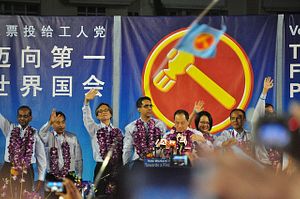Singapore is a curious anomaly within political science. In its status as the wealthiest non-democracy in history, many have anticipated the outcome of the next general election as a watershed moment for the city-state. Since the May 2011 elections, in which opposition parties won a record-breaking six seats, a number of commentators – including Prime Minister Lee Hsien Loong – have suggested that the 2016 plebiscites will be the first genuinely contested election in decades.
Eagerness to exaggerate Singapore’s democratic qualities, however, should not be allowed to obscure the structural difficulties facing opposition candidates. In power since 1959, the ruling People’s Action Party (PAP) continues to hold 90 percent of seats in Singapore’s Parliament, with the majority of the remaining seats filled by unelected “nonconstituency” MPs and “nominated” MPs. These positions create the impression that PAP policies are the product of serious partisan debate; in reality, their members simply act as a compliant opposition.
Given the formidable constraints imposed on authentic opposition figures, however, it is unsurprising that candidates may prefer unelected positions. The PAP is notorious for its practice of bringing lawsuits against opposition members to disable them from running for election, enabled by the absence of parliamentary privilege laws. Opposition figures can therefore be sued for defamation upon criticizing the PAP.
Litigation is generally pursued until the person is declared bankrupt, whereupon they are disqualified from political candidacy. This practice is a particularly egregious example of the PAP’s “soft” repression, with prominent targets including Worker’s Party leader Joshua Benjamin Jeyaretnam, bankrupted in 2001, and Singapore Democratic Party’s leader Chee Soon Juan, bankrupted in 2011.
Political manipulation of the legal system has had a pervasive impact on freedom of expression in Singapore. The Public Order Act, for instance, requires that persons engaging in political discussion must register with the government, and the Public Entertainment and Meetings Act forbids four people from assembling without police permission. Legal action is frequently taken against the editors of online news and discussion forums, with blog authors often pressured to register as members of political bodies if their posts touch upon national issues.
Whilst individuals are often targeted through the legal system, the PAP have also exercised punitive politics against whole constituencies. The PAP has a history of diverting infrastructure upgrades away from regions that voted against them. In a classic manipulative twist, PAP candidates have been known to then pinpoint the constituency’s disadvantage – deliberately induced by their government’s withholding of funds – as evidence that the opposition have mismanaged the seat.
Another significant constraint lies in the PAP’s ability to create and re-shape constituencies. Rather than adhering to static boundaries, the PAP’s executive branch has complete control over constituency designation. Whilst the PAP has used this power to inconvenience opposition efforts by declining to announce boundaries until late in the election cycle, it has been manipulated in subtler ways.
Since 1988, the PAP had held the ability to create Group Representation Constituencies (GRCs), which necessitate the provision of six candidates per party. In contrast to the demands of fielding one opposition candidate in Single Member Constituencies, GRCs are almost impossible to win. In February 2011 the PAP’s Electoral Boundaries Review Committee announced that the Single Member Constituencies of Nee Soon Central and Nee Soon East – where the Workers’ Party had gained significant support during the 2006 elections – were to become a GRC. With no independent body to monitor such blatant gerrymandering, minority parties simply have to accept that GRCs are practically forfeit. Even supposing that a minority party can win such a seat – as witnessed in a surprise victory in the Aljunied GRC for the Workers’ Party in 2011 – there is nothing to prevent the PAP from simply redrawing the boundaries of that GRC in the following cycle.
Opposition parties will have to overcome some huge obstacles during the next two years. It’s not all bad news, however; the PAP’s “performance legitimacy” argument (the notion that authoritarianism is justified by proven economic success) has met its own challenges in recent years. One crucial impetus for liberalization is Singapore’s increasing inequality. Over recent decades, Singapore’s Gini coefficient has increased from .43 in 1998 to .48 in 2014, placing Singapore’s income gap well above other Asian tiger states such as Japan, Korea and Taiwan.
Although PAP dominance may be assured whilst Singapore’s “founding father” Lee Kuan Yew continues to loom over political developments, new generations of leadership will not be able to utilize his legacy of economic success as a source of legitimacy. In their efforts to retain the support of the populace and prevent regime breakdown, the PAP may find it expedient to open up the political arena to competition. As growth slows and dissent increases, this may be the best means for the PAP to transform its party image from being the “only choice” to the “best choice.”
Sally Andrews studies Laws/International and Global Studies at the University of Sydney and works as a Director of the West Papuan Development Company, focusing on improving well access and sanitation infrastructure in the Papuan provinces.
































